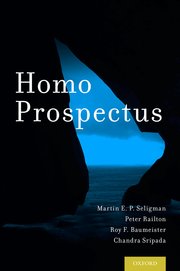Much of psychology can be explained in terms of the present moment. What matters is how we perceive and respond to our experiences on a moment-to-moment basis. Psychology has also been unduly influenced by the past, looking ever backwards to understand the miracle of human thought and personality. Who we are, we have been told, is a mix of genetic programs handed down from generations past and the memories of experiences accumulated over our lifetime.
But according to Martin Seligman, a leading authority in the field of Positive Psychology, we have been underestimating the impact of the future. Humans are, by nature, “prospective,” he says. “It is anticipating and evaluating future possibilities for the guidance of thought and action that is the cornerstone of human success.”
 His new book, Homo Prospectus, written with fellow Psychology Professor, Roy Baumeister and Philosophy Professors Peter Railton and Chandra Sripada, is an attempt to turn the lens of psychology towards the future, opening the door to greater understanding about our thoughts and emotions.
His new book, Homo Prospectus, written with fellow Psychology Professor, Roy Baumeister and Philosophy Professors Peter Railton and Chandra Sripada, is an attempt to turn the lens of psychology towards the future, opening the door to greater understanding about our thoughts and emotions.
Thinking prospectively about human functioning leads to some interesting shifts in the way we view our minds. We think of our memory, for example, as a tool for recording past experiences, but plenty of research has shown how faulty our memories can be and how easily they can be re-written. If memory is a recording tool, it is a poor one at that.
Thinking prospectively, Seligman and his co-authors propose that the role of memory is not to remember the past but to prepare us for the future. Our memories are not accurate recordings of what has happened but narratives we invent “for the forward guidance of thought and action . . . Memory is for doing.”
Our emotions, which we tend to think of as a response to things that have happened, may also be primarily about guiding us towards the future. Our emotional reactions (fear, anger, regret, sadness or joy) are experienced viscerally in the body, preparing us for what is to come, “not simply to register a response to what is present now or what has come before.”
What makes prospective theory revolutionary is not the idea that human behavior is guided by emotions, but the idea that human behavior is guided by “anticipated emotions.” Our emotional experiences help us to better predict how our choices and experiences will make us feel in the future, and this motivates our behavior.
The prospection lens gives us a new way of thinking about what it means to be human (hence “Homo prospectus” rather than “Homo sapiens”) with ramifications for how we view mind wandering (how we develop “cognitive maps” to help us navigate in the future,) relationships (how we construct those maps not individually, but in collaboration with others,) or free will (determinism becomes somewhat irrelevant if we accept that to be human is to live in a world of future probabilities.)
One of the most interesting chapters in the book is on “Creativity and Aging” with guest appearances by Marie Forgeard and Scott Barry Kaufman. From an evolutionary standpoint, it would be easy to assume that the future is only important up to the point of reproduction, and psychology has produced much research to show how creativity and cognitive function decline as we get older. But this chapter points to the evolutionary benefits of creativity throughout our lifespan, establishing economic security and driving innovation to create a better life for our offspring. The human race has advanced by our ability to hand down innovations from one generation to the next, based on our imagined prospection of their future needs.
This feels like a turning point for the field of psychology, changing course into exciting and relatively uncharted territory. At the very least, it feels good to let go of the shackles of our past—we can release some of the psychological “baggage” of past experience and turn our gaze towards the horizon, with confidence that who we are is powerfully shaped by things that have not yet happened.
—
References and recommended reading:
Seligman, M. E. P., Railton, P., Baumeister, R. F., Sripada, C. (2016). Homo Prospectus. Oxford.


Super Kool stuff!
How timely and apropos as to what is happening with social listening: using Google’s Natural Language Processing (machine learning and social intelligence) to predict when an ‘influential’ (or just everyday/regular person) will be using a certain product, recommend a certain spa (or whatever trend for example). NLP can give you insight as to who to target at the moment that matters when they will make the decision to book or buy in the future. #fascinating
I am off to B+N to purchase the book – this is very big and a growing field! Yes, it all comes down to how your past brings you to the present and how it “anticipates and evaluates future possibilities”(paraphrasing your words above).
Thanks for bringing it to my attention (and many others too)!